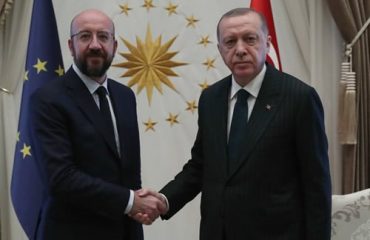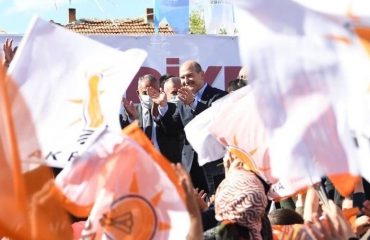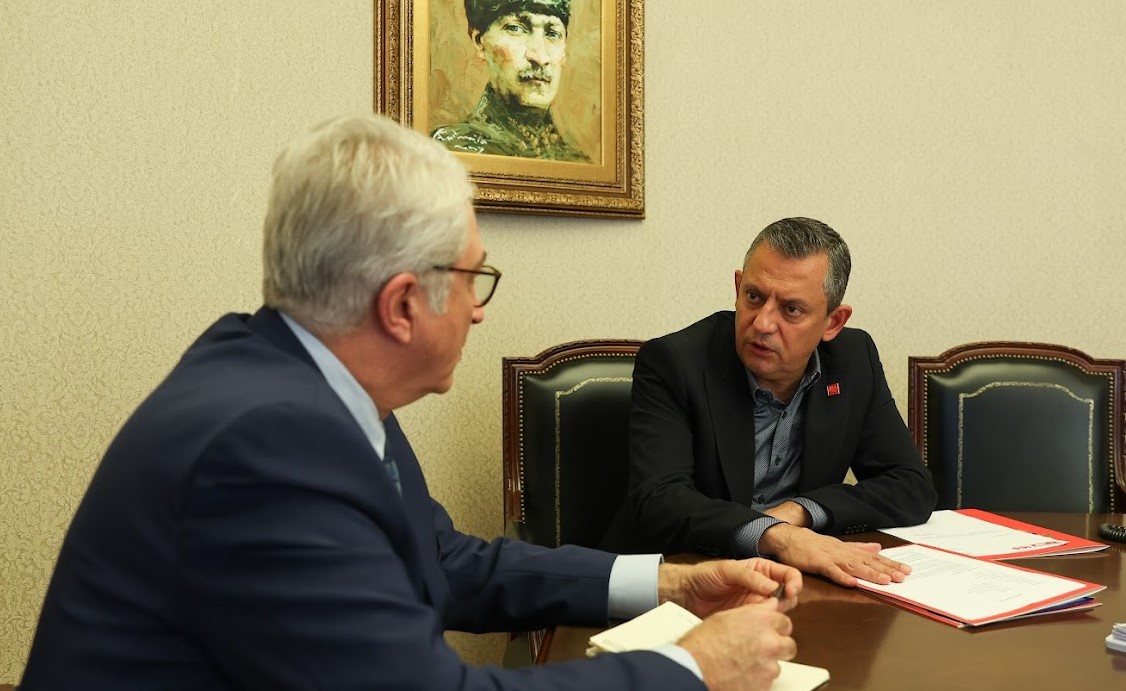
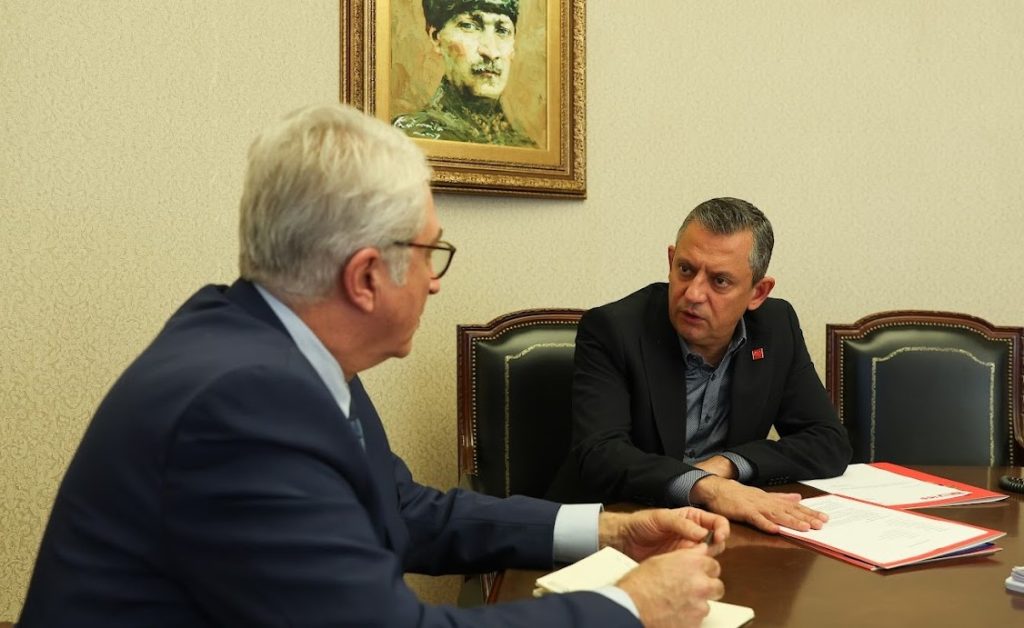
CHP leader Özgür Özel stated that under current conditions, President Recep Tayyip Erdoğan cannot run for another term, however, if he seeks re-election, the deadline for him to “knock the CHP’s door” for a compromise would be November 2025.
Turkish opposition Republican People’s Party (CHP) leader Özgür Özel stated that under current conditions, President Recep Tayyip Erdoğan cannot run for another term, however, if he seeks re-election, the deadline for him to “knock the CHP’s door” for a compromise would be November 2025.
Answering YetkinReport’s questions, Özel said, “He shouldn’t come after November 2025. We are on a path to power. We’re available until two and a half years (of presidential term) are up, after that we’re not. Two and a half years from us, two and a half years from you. This is a sign of our confidence.”
Stating his aspiration to be remembered in CHP history as the leader who brought the party back to power after his predecessor Bülent Ecevit half a century later, Özel emphasized that he doesn’t intend to “take the final penalty shot himself,” at the last moment.
He said that whoever is most prepared at the time will be the presidential candidate. This decision, he noted, will be made by party committees in accordance with the new bylaw, not by him alone.
Addressing the recent discussion about Ankara Metropolitan Mayor Mansur Yavaş’s outburst at the recent Statute Congress, Özel admitted, “The fault lies with us. There was no ill intention, but there was an oversight. We’ve discussed it, and there’s no lingering resentment.”
Here are Özel’s responses to our questions:
Özel on Erdoğan’s potential candidacy
Q: You’ve faced criticism for suggesting Erdoğan could run again despite constitution. Why do you feel it’s necessary to make this point?
A: The criticisms surprised me. Last year, the Supreme Election Council ruled that this would be Erdoğan’s second term. The Constitution allows for two terms, meaning if the 5-year term concludes normally, he can’t run again. As this is his second term, even if he dissolves Parliament, he can’t be a candidate. However, if Parliament calls for an election, Article 116 of the Constitution permits him to run one more time.
For Parliament to make such a decision, the AKP and MHP coalition has around 330 votes, but 360 are required. They can’t achieve this alone; they’d need our support.
What about constitution?
Q: But you’re suggesting it’s possible despite the Constitution. Isn’t this contradictory?
A: That’s the crux of the issue. Our base and opposition voters are calling for early elections, which we support. But it’s inconsistent to demand early elections while insisting Erdoğan shouldn’t be a candidate, because Article 116 allows for his candidacy if Parliament decides on an election.
In my view, his previous candidacy was unconstitutional, but the Supreme Election Council ruled on it, and their decisions are final. Moreover, by nominating a candidate against him and participating in the election, we implicitly accepted it as his second term. So, during this second term, if Parliament – not Erdoğan himself – calls for an early election, he can run once more. The constitution is unambiguous on this point.
We already consider this five-year-term contentious. Our stance is: don’t approach us just three or six months before the regular election period.
Deadline November 2025
Q: What exactly are you proposing?
A: We’re suggesting we split these five years: two and a half years for us, two and a half for them. I’m saying, when their two and a half years are up, bring it to Parliament and let’s hold an election. This would be around October 2025.
We’re making it clear: if Mr. Erdoğan wants to be a candidate, he shouldn’t come to us after November 2025. That won’t be acceptable. We’re open to discussion until the two and a half year mark, but not after.
Q: Isn’t this approach somewhat of a gamble?
A: It’s a reflection of our confidence. We trust in ourselves. If Erdoğan has similar confidence, he should accept. He can come in September or October, but not after November.
On CHP’s performance in polls
Q: You mentioned confidence, but the MetroPoll survey suggests you’re losing ground. Doesn’t this concern you?
A: MetroPoll is a reputable institution; our analysts suggest there might be a sampling error. Such errors can occur; it’s not unusual. I expect we’ll see a correction in upcoming months. We regularly monitor seven surveys. In five of them, we’re widening our lead over the AKP. One shows the gap narrowing, and only one indicates we’ve fallen behind. We also conduct our own polling, which I consider crucial.
Q: Polling can be expensive…
A: Let me explain how we fund it. Setting up a rally stage with a sound system costs around 5.5 million lira today. In the last elections, we held 105 rallies. I conducted 99 of them from atop our party bus. This saved us approximately 550 million lira. A significant portion of these savings went into our polling and evaluation budget, with some allocated to party organizations.
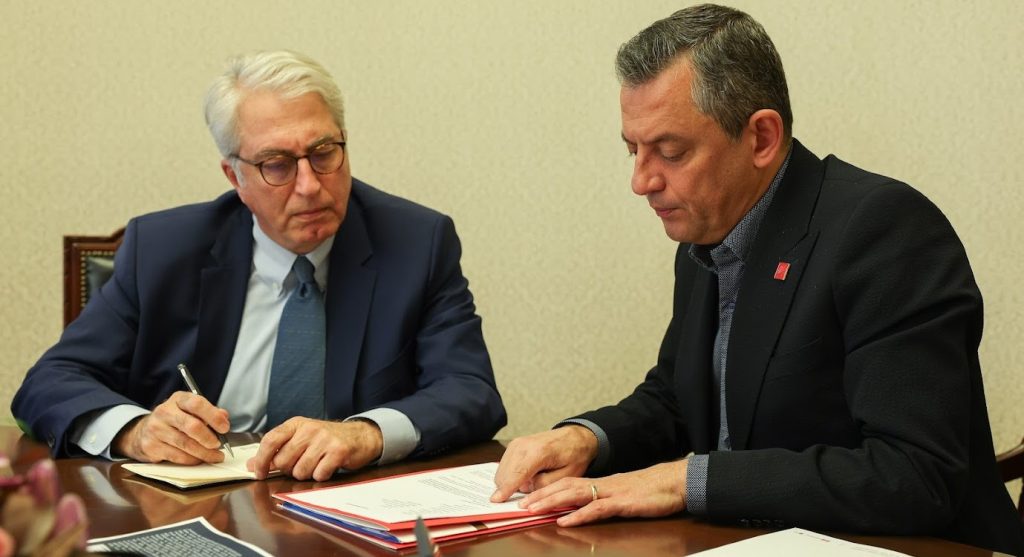
Özel asserts that the Congress results demonstrate the CHP base’s focus on gaining power and that internal debates have little resonance with the grassroots.
Taking the final penalty kick
Q: There’s a popular analogy: Mansur Yavaş is the right-winger, Ekrem İmamoğlu the left-winger, and you’re the coach. However, some express skepticism, suggesting you might “take the final penalty shot yourself.” How do you respond?
A: There’s no question of me taking the final shot. Whoever is most prepared when the time comes will step up.
We’re progressing towards power; that’s our belief. Today is Tuesday, and we’re one day closer to CHP leadership than we were yesterday. That’s what we’re working towards.
Our party values its history deeply. Consider the AKP, where founding members are nearly shut out. In contrast, we hold in high regard our leader who served as general chairman for just nine months.
Özel: “Honoring Atatürk’s legacy”
Do you know how I aspire to be remembered in CHP history?
Q: You mentioned being the coach, but…
A: I aim to be remembered as the leader who led the CHP back to power, following in the footsteps of Bülent Ecevit. Our party was established by Mustafa Kemal Atatürk. We are custodians of his legacy. Yet, we’ve fallen short of fulfilling his vision.
A year ago, on September 9, 2023, I reflected deeply on this, acknowledging, “We’ve failed to realize his will.” That was the moment I committed myself to this path. Returning CHP to power is my paramount political objective, my greatest aspiration.
Regarding your penalty kick analogy, the decision won’t be mine alone. We’ll decide collectively with our party councils. I place immense importance on the article in our new bylaw concerning the selection of our Presidential candidate.
Q: I wanted to address that point. The public’s main takeaway from the Congress was Mr. Mansur’s outburst. You and Mr. Ekrem attempted to smooth things over. What happened there?
A: We made a mistake there. There was no malicious intent, but a mistake. Mr. Ekrem had requested to speak on the first day. When the schedule overran, his speech was pushed to the second day. Upon reviewing the program, I noticed Mr. Mansur wasn’t included. I immediately asked our colleagues to invite him to deliver a speech if he wanted to. It was an organizational oversight. We’ve since discussed it, and there’s no lingering resentment.
Rare in CHP history
Q: Let’s discuss the Congress. In your view, did the debates, such as those about primary elections, yield the benefits you hoped for your party?
A: Our party emerged stronger from the Congress. We’ve been developing the bylaw with input from the grassroots for months. The entire party organization has reviewed it. We consulted all our former leaders. We sought Mr. Kemal (Kılıçdaroğlu)’s input both beforehand and on the final draft. (He displays the correspondence on his phone.) See, I sent it at 18:56, and it was read at 18:57.
Article 52, which public perceived as controversial due to its focus on primary elections, received the most opposing votes. But do you know the margin? Only 36 out of 1173 delegates voted against it. When some members challenged the show of hands, we counted votes individually. Most articles passed unanimously, which is rare in CHP history. Even that contentious article passed with a 97 percent majority, with an average of 99 percent across all articles. Notably, the Ankara, İzmir, and Adana organizations, which had been our harshest critics, stood with us almost unanimously this time. I find this extremely significant.
Özel on the importance of the grassroots
Q: What do you attribute this shift to?
A: Primarily, I believe it reflects the party’s focus on attaining power, with members prioritizing this goal over internal disagreements. It became clear that presumptions about delegate allegiances were unfounded. We realized that manufactured controversies didn’t resonate with our base.
I also credit the importance we’ve placed on our organizational structure. The CHP organization saw that we valued their input and took their opinions seriously. After the Congress, a colleague remarked, “We managed not to dishearten or overwhelm the organization.”
Consider this: we had 72 consultants whose roles were largely unclear. We’ve parted ways with them, freeing up 24 rooms at Headquarters. We’ve dedicated the entire 4th floor to provincial and district chairs. Now, when our provincial and district leaders visit Ankara, they have dedicated offices. They have access to secretaries, computers, TVs, refreshments – whatever they need. If they need to meet someone in Ankara, they no longer resort to hotels; they can convene right here in our party facilities, in proper meeting rooms.
Q: What’s on the horizon?
A: Yesterday (September 9) we held our first Central Executive Committee meeting following the Congress. Within the next fortnight, we’ll start mapping out our strategy and preparing for the Program Congress, which could take anywhere from 8 months to a year. We’ll be addressing key questions: What is CHP’s stance on agriculture, foreign policy, administration, health, and education? How does CHP envision governing Turkey?
We’re taking our message to the grassroots. This isn’t just about protest rallies or making demands. Across all 81 provinces and 973 districts, we’ll first gather input on what citizens want, and then we’ll start articulating our vision.
How does CHP intend to govern Turkey?
This concludes the interview with Özel. What struck me as particularly significant were the two questions Özel posed to himself: What does CHP stand for, and how does CHP intend to govern Turkey?
These questions suggest that CHP Headquarters is at a stage of accurately diagnosing its own challenges. Currently, there’s a sense of “freestyle swimming” among CHP politicians when it comes to positions on everything from agriculture to economic management, from foreign policy to immigration policy. While this is sometimes lauded as a demonstration of ideological diversity and internal democracy within CHP, it also occasionally provides easy targets for the already vigilant AKP. Özel’s emphasis on the new CHP program seems to be an acknowledgment of this issue.
A novel point for me was his decision to repurpose a floor in the headquarters building, previously occupied by consultants whose roles were unclear, for use by party members visiting Ankara on official business, from provincial and district chairs to mayors. His message is clear: “We value them, and in turn, they value us.”
Özel’s proposals to Erdoğan – the “two and a half-two and a half” split or the “November 2025 deadline” – are likely to spark significant political debate.
CHP leader echoes predecessor: Erdoğan ineligible for another presidential term
